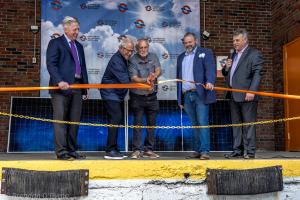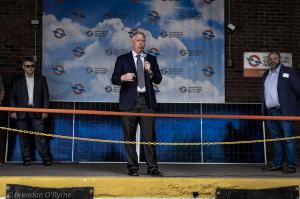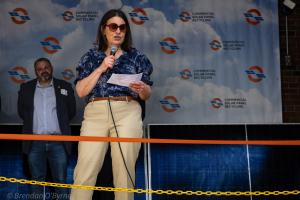From Solar to Circularity: Commercial Solar Panel Recycling Cuts the Ribbon on NJ’s First PV Recycling Center
CSPR opens New Jersey’s first solar panel recycling facility, marking a major step toward solar waste solutions and circular energy practices in the U.S.
The Phillipsburg facility anchors CSPR’s growing national network, which includes operational centers in Canajoharie, New York, and Atwater, California.
The ribbon cutting is a step in addressing the growing volume of solar waste as panels reach the end of their useful life. With landfill space dwindling, responsible recycling solutions are urgently needed across New Jersey and the U.S. In November 2024, CSPR was granted a Research, Development, and Demonstration (RD&D) permit by the New Jersey Department of Environmental Protection (NJDEP)—the first permit of its kind specific to PV recycling.
“Today is a testament to what happens when innovation, environmental protection, and practical solutions come together,” said Janine MacGregor, Director at NJDEP who spoke at the ribbon cutting. “The department is very proud, honored and happy to celebrate the launch of CSPR’s Phillipsburg facility. I thank you for the foundation for New Jersey’s future to ensure that these materials [solar panels] are recycled and handled responsibly.”
Co-sponsored by the Commerce and Industry Association of New Jersey (CIANJ), the event welcomed over 100 guests, including New Jersey State Assemblyman Erik Peterson and Phillipsburg Mayor Randy Piazza, Jr., both of whom addressed the crowd of attendees. Additional guests included members of the Warren County Council, Warren County Board of Commissioners, New York Solar Energy Industries Association (NYSEIA), Mid-Atlantic Solar & Storage Industries Association (MSSIA), Public Service Enterprise Group (PSEG), NJ Clean Communities Council, Phillipsburg Town Council, Phillipsburg UEZ (Urban Enterprise Zone) Council Members, and Rutgers University.
“We are honored by the turnout and inspired by the collective enthusiasm for sustainable solutions and business support,” said Glenn Laga, CSPR President and Co-Founder. “Thanks to NJDEP’s forward-thinking approach, we are proud to be the first to demonstrate what’s possible in PV recycling in New Jersey.
Peter Goldenberg, Co-Founder, added, “The energy at the event was palpable. People are increasingly aware of the solar e-waste challenge—and more importantly, they’re optimistic about the solution CSPR provides.”
CSPR is committed to scaling its operations to meet the growing demand for solar recycling nationwide, supporting the nation’s broader goals of landfill diversion, circular economy adoption, and environmental leadership.
About Commercial Solar Panel Recycling (CSPR)
Commercial Solar Panel Recycling (CSPR) is a national leader in end-to-end solutions for the responsible disposal, recycling, and repurposing of decommissioned and end-of-life solar panels. Serving installers, utilities, roofing contractors, recyclers, and commercial and industrial operators, CSPR is driven by a zero-landfill mission to reduce renewable energy waste and build a more sustainable future.
Headquartered in Phillipsburg, New Jersey, with an additional processing facility in Atwater, California, CSPR provides nationwide service—including transportation, on-site packing, and advanced processing of used or early loss photovoltaic (PV) modules. As a proud member of SEIA, CSPR helps clients meet regulatory standards, maximize material recovery, and actively support the circular economy.
Learn more at https://commercialsolarpanelrecycling.com.
# # #
Sarah Damaskos
Commercial Solar Panel Recycling
+1 201-407-8211
email us here
Visit us on social media:
LinkedIn
Legal Disclaimer:
EIN Presswire provides this news content "as is" without warranty of any kind. We do not accept any responsibility or liability for the accuracy, content, images, videos, licenses, completeness, legality, or reliability of the information contained in this article. If you have any complaints or copyright issues related to this article, kindly contact the author above.
Waste to Energy Market to Reach $56 Billion by 2032, Driven by Clean Energy Demand and Waste Reduction Efforts
Heritage Pools Named to 2025 PSN/Hayward Top 50 Builders
Selling a Business Doesn’t Have to Be Scary – New Book Shows Owners How to Cash Out and Live Large
Kalendarium
Więcej ważnych informacji
 Jedynka Newserii
Jedynka Newserii

 Jedynka Newserii
Jedynka Newserii

Transport

Polska przeciwna przedłużeniu umowy UE–Ukraina o transporcie drogowym. Uderza ona w krajową branżę transportową
Parlament Europejski większością głosów poparł przedłużenie umowy o transporcie drogowym między Unią Europejską a Ukrainą do końca 2025 roku. Zdaniem polskich europosłów, którzy głosowali przeciw, podtrzymanie liberalizacji przewozów drogowych przyczyni się do dalszego obniżenia konkurencyjności polskich firm transportowych. W przeciwieństwie do ukraińskich przewoźników muszą one spełniać szereg unijnych wymogów. Polska delegacja planuje przedstawić swoje stanowisko europejskiemu komisarzowi ds. zrównoważonego transportu i turystyki.
Transport
M.Kobosko: Wszyscy zapłacimy za eskalację między Izraelem a Iranem. Kraje UE powinny robić więcej dla budowy swojego własnego bezpieczeństwa

– Mrzonki o armii europejskiej są mrzonkami, to trzeba sobie jasno powiedzieć. Każdy z krajów członkowskich Unii Europejskiej musi, i to się na szczęście już dzieje, nie tylko myśleć i mówić, ale też robić coraz więcej dla budowy swojego własnego bezpieczeństwa w koordynacji wspólnej – uważa Michał Kobosko, poseł do Parlamentu Europejskiego z Polska 2050. W kontekście światowych konfliktów, w tym na linii Izrael–Iran, jego zdaniem Polska powinna się skupić na współpracy zarówno ze Wspólnotą, jak i Stanami Zjednoczonymi.
Muzyka
Trwający Festiwal Mozartowski przyciąga tłumy melomanów. To jedno z najważniejszych wydarzeń w stolicy

Artystka zaznacza, że za sprawą Warszawskiej Opery Kameralnej jeszcze przez dwa tygodnie Warszawa będzie rozbrzmiewać Mozartem. Kolejna edycja festiwalu poświęconego temu wybitnemu kompozytorowi zajmuje ważne miejsce w kulturalnym kalendarzu stolicy i przyciąga tłumy melomanów. A przed nimi jeszcze sporo atrakcji. Alicja Węgorzewska szczególnie zaprasza na dwie premiery, jedną skierowaną do młodych odbiorców, drugą – dedykowaną koneserom. Niezwykle ciekawie zapowiada się także nowy sezon artystyczny w WOK-u. Twórcy już pracują nad kolejnymi spektaklami i nagrywają nowe płyty.
Partner serwisu
Szkolenia

Akademia Newserii
Akademia Newserii to projekt, w ramach którego najlepsi polscy dziennikarze biznesowi, giełdowi oraz lifestylowi, a także szkoleniowcy z wieloletnim doświadczeniem dzielą się swoją wiedzą nt. pracy z mediami.











.gif)

 |
| |
| |
|